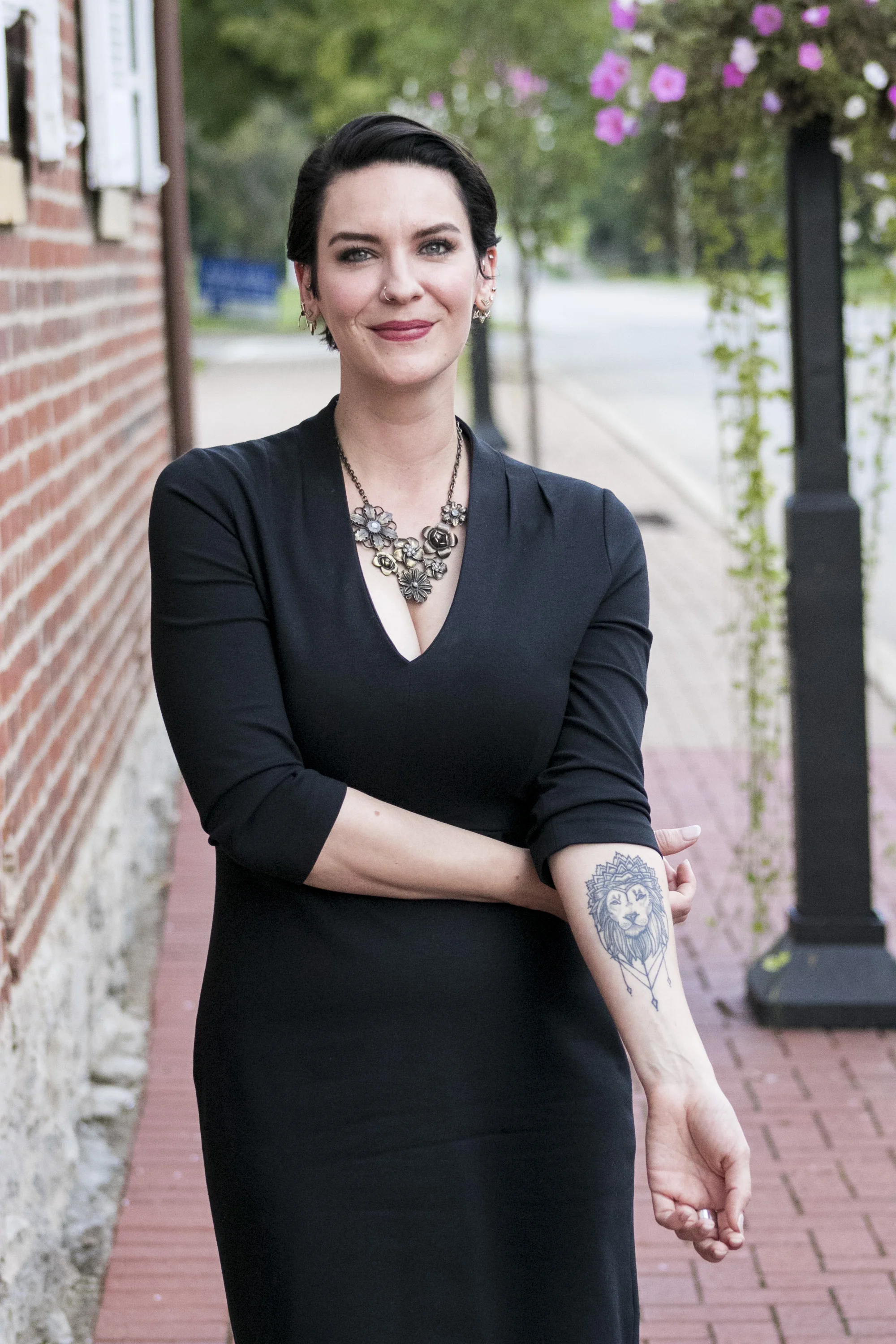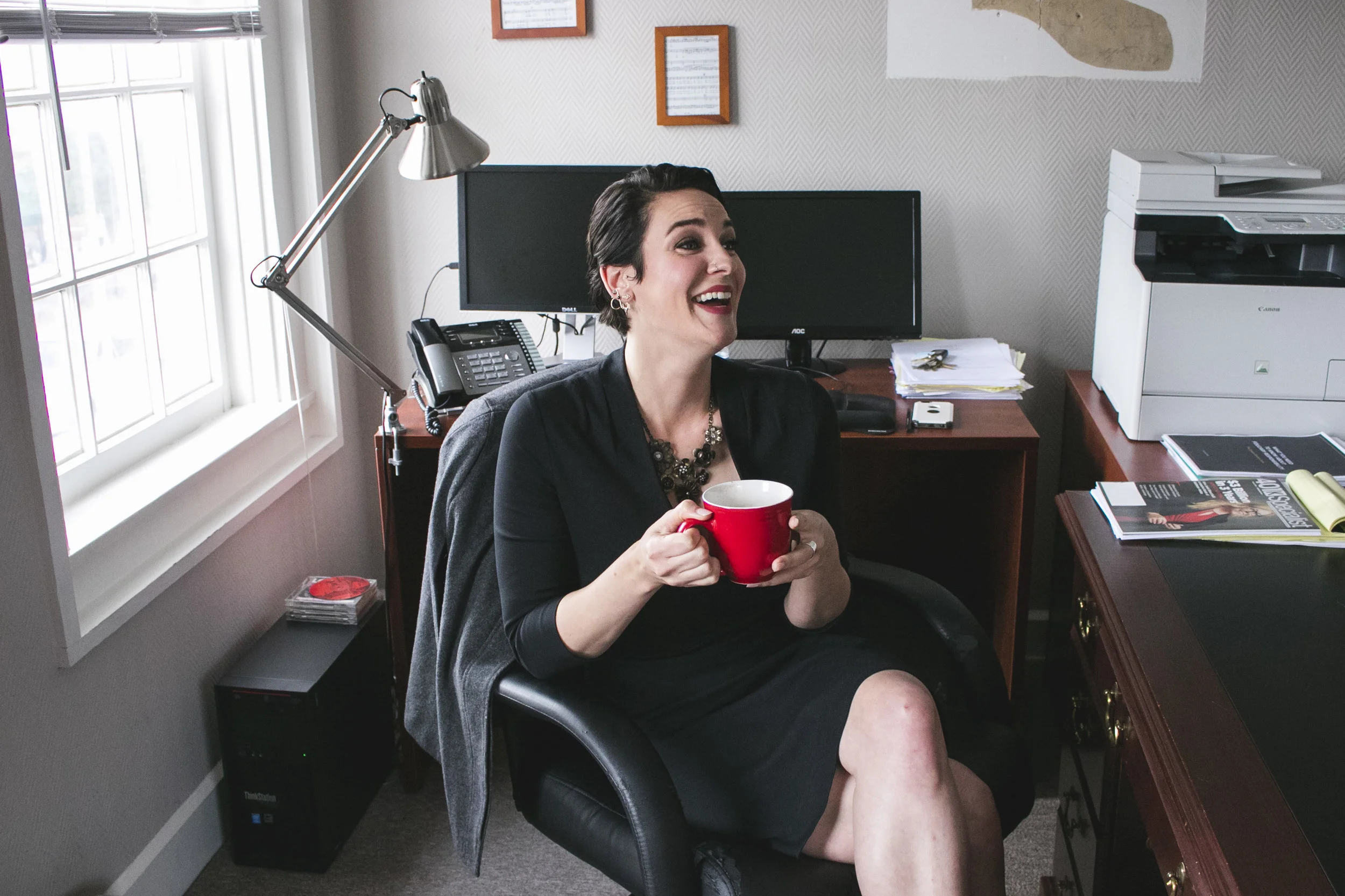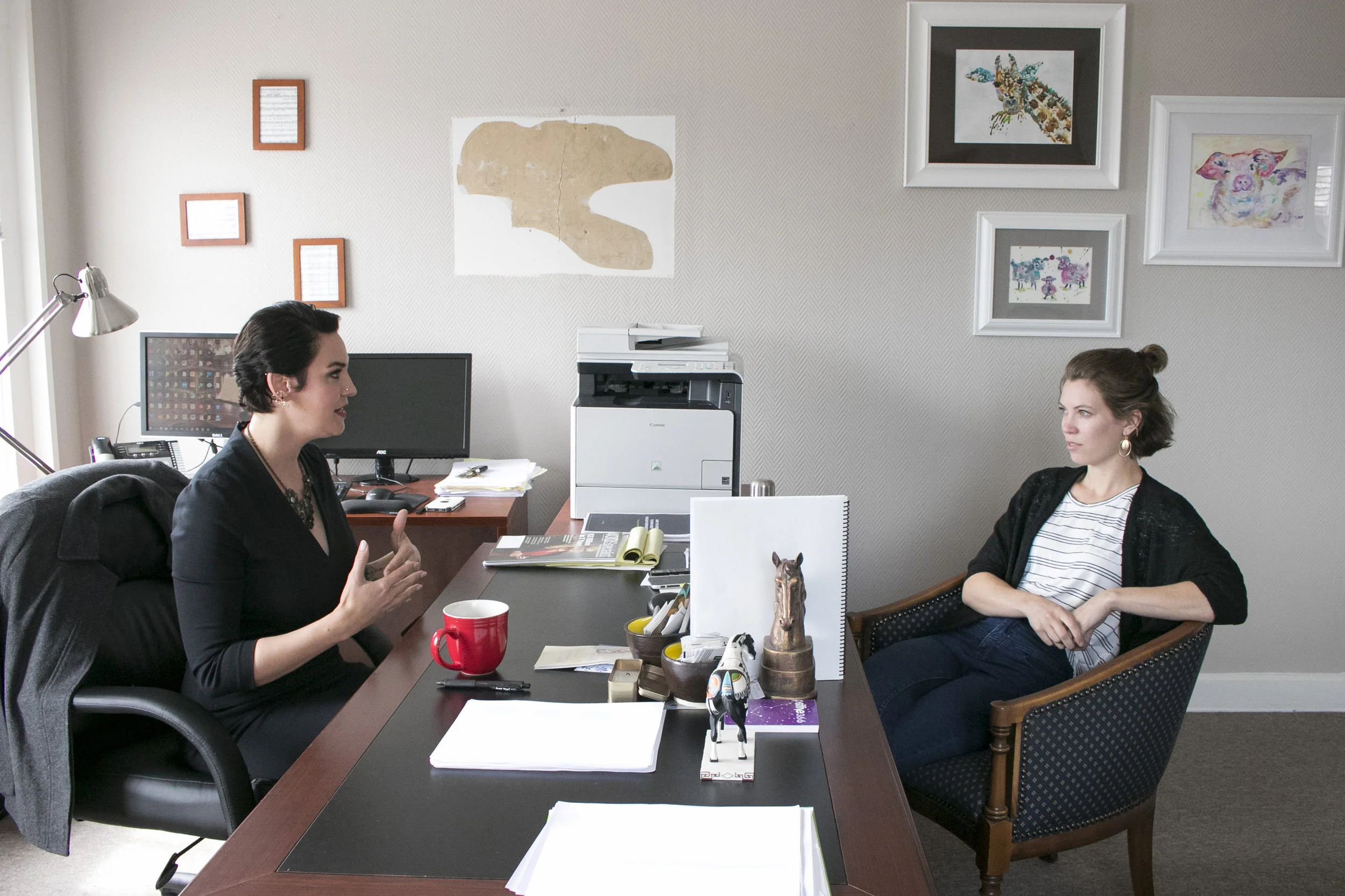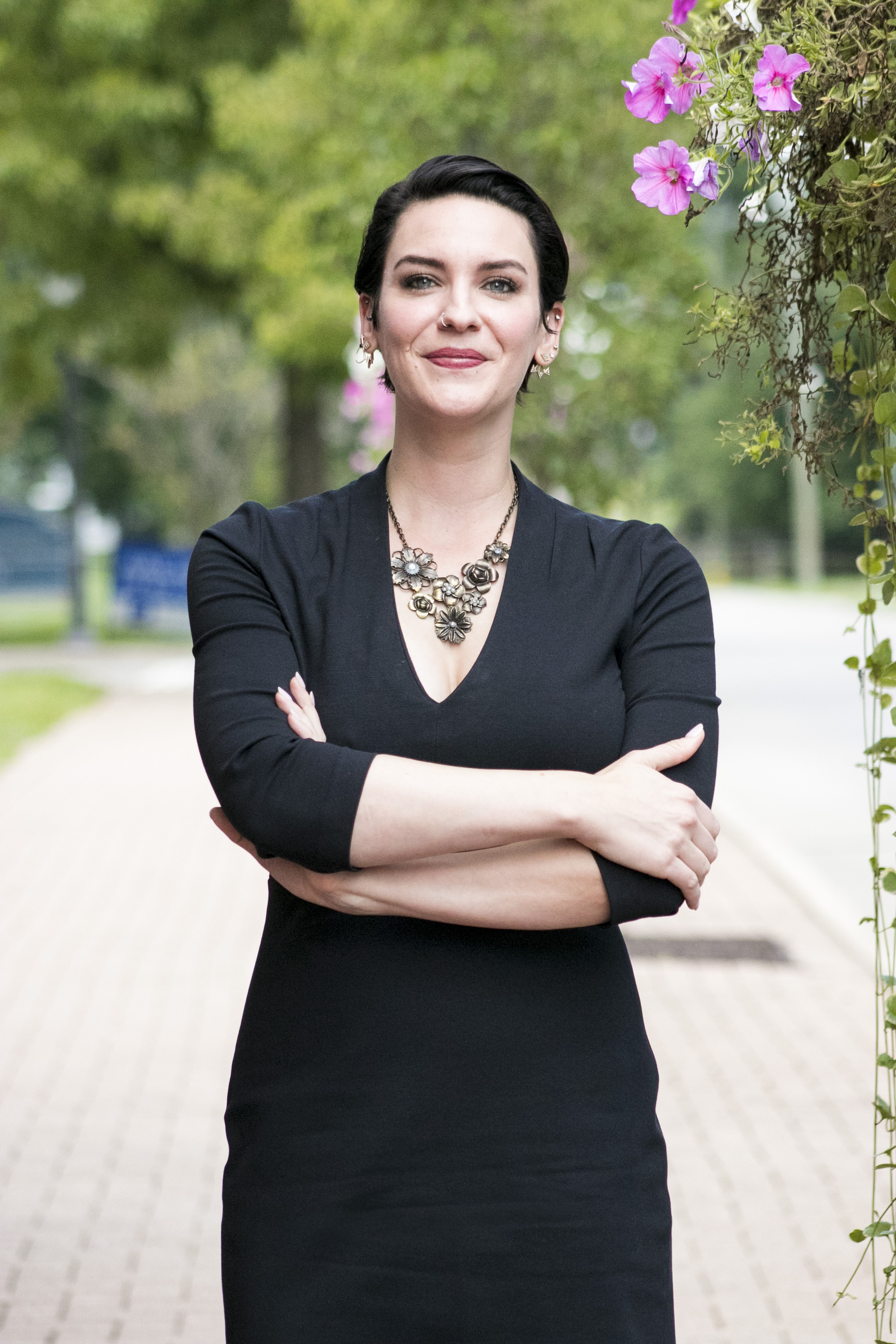Lauren Morris: Redefining the Rules of Financial Planning
As I started to prepare for my interview with Retirement Plan Advisors’ Lauren Morris, I began to think, “How on earth am I going to make financial planning sound exciting?”
A quick phone call with Morris and that concern vanished. Morris, a managing member of the firm, isn’t your typical retirement planning advisor. “I want to redefine the rules of financial planning,” she told me. She has real dreams and a vision for this company and its purpose, and that’s something any of us can relate to.
Read on to learn that “wealth planning” isn’t only for the “wealthy.” You’ll learn that money and purpose don’t have to be mutually exclusive. You may realize that a financial planner can also be a friend. Let’s dive in.
Interview by Kiersten Feuchter. Photography by Chelsie Walter.
This interview is sponsored by Retirement Plan Advisors.
Tell us a little bit about yourself.
So my path to this business is completely nonlinear. I came into it by happenstance. I was trained as a singer, and then I got a degree in creative writing, and as one does, you graduate and discover that there aren’t many jobs for singing creative writing majors. So I bounced around and ended up selling office space, and basically I met my now business partner, and he just said to me, “Why are you doing what you’re doing? You could do what I do.” Which I thought was ridiculous, but I discovered that I have an aptitude for it and I enjoy it.
I think particularly because there’s not much representation of women in this industry, it’s really important to me to not just put my best foot forward, but also to show people that, with diversity of perspective, you can get better advice. The niche that I’ve carved for myself within this business is really a focus on education, because there’s a lack of it, and it’s a lack of meaningful education… bringing people advice that is relevant to their lives instead of someone yapping on about inverted yield curves, because nobody cares.
Condensed to a kernel, basically, I want to deliver better advice and better education to the people who need it. You can walk down the street and throw a rock and hit 10 financial advisors, and they’re all looking for high net worth individuals, and I’m like, “Okay, well, that’s good. There’s a space for you, too,” but I’m about delivering something of value to people who actually need it, and meeting them where they are. So that’s what I do, and I had an opportunity to work my way up through the ranks in this business and to become a managing member. I have an opportunity to bring my vision to it.
Can you share more about those first conversations with your now-business partner, Tony? What were your first days here like?
It was an apprenticeship in the truest sense of the word. He brought me into the business, and I learned just by observing him. I didn’t have a background in economics or finance or business, so he would bring me into the meetings and just give me a chance to watch and listen. I picked up on a lot of things sort of by osmosis, and then he slowly started pushing me towards, “Get your insurance licenses and your Series 65.” I’ve built my education one building block after the other. So much of it was just him giving me an opportunity, seeing something in me… I mean, he’s a feminist. He just is, and I think he wanted to change the direction of this business to bring a new perspective.
When I started all those years ago, I was doing back office administrative support, and he would bring me into meetings with clients. I was dressing conservatively, hiding my tattoos, taking out my nose ring, all this stuff. I was like, “I must present.”
And over the years, he’s made it clear: “I brought you in for the person that you are,” and I just realized I was playing this role of how I thought I was supposed to look – which was basically a middle-aged white man. So I stopped playing that role, and I think that’s helped me in my journey.
What were your first impressions of the financial planning world?
I was struck by how differently I felt our firm delivers education to people. We work with a lot of nonprofit 501(c)(3) organizations, several of which are caregiving organizations that provide care to individuals with mental and physical disabilities. A lot of the people who work for these organizations are working two and three jobs. They’re working really, really hard, and their question is not about flattening yield curves; it’s, “How do I save money? How do I avoid having to take a loan out of my 401(k) if my A.C. goes out?” I think it’s easy to become disenchanted by this industry because there is a lack of care. And I think there’s also a lack of touch with reality and what many people really want or need. That was one of the first things that struck me.
Would you mind explaining: “For dummies,” what is financial planning?
It really depends. It’s kind of what we’re doing now; it’s having a conversation and not making assumptions about someone’s circumstances. I have people who come in here who say, “I don’t really have a lot of money to invest.”
And I ask, “Well, what do you need? What are you looking to do?” So that can be helping someone put together a portfolio to meet some kind of financial objective, whether that’s putting aside money for their kids for future education expenses; or that’s helping them understand social security and when they should take it; and “What does the rising cost of healthcare mean as I’m trying to save for retirement?” It covers a lot of ground, and that’s where the education comes in. It’s not just “One size fits all.”
There are companies who do just “wealth planning” – okay, whatever that is. [Laughing.] We really try to work with individuals to help them meet whatever objective that is, and then structure their investments to try to help deliver that.
If your goal is to just make a ton of money in a short amount of time, I’m probably not your girl. But if your goal is about figuring out what drives you, what motivates you, what inspires you, what is the purpose for this money – that’s what I want to do.
So what happens when they walk in the door?
The preliminary discussion is kind of getting a feel for “What are you trying to do? When are you trying to do it?” And then we start to navigate some of those roadblocks. We talk about social security; we talk about Medicare; we talk about aging parents; we talk about estate planning; we talk about anything that might be relevant to the discussion, and then we start asking for stuff from them. We’d like to see a social security statement; if you’ve got a 401(k); if you’ve got an IRA; if you’ve got gold bullion under your bed, that would be helpful to know about. We take all of that; we compile it – we use a software planning program because it helps us dump a bunch of data in – and then we play with it.
And once we’ve got all of that, that’s when the fun stuff happens. We start getting a lot more of the emotional, values-driven conversation about the things that are really important to them.
What would you say is the number-one misconception about financial planning?
One of the things that I hear a lot from people is, “I’m never going to be able to retire,” or they have an idea of what retirement means. A misconception is that it is just about investing or it’s just about buying low and selling high. The conversation that we try to have with people is, “What does retirement mean to you?” Is it the day you decide to stop working? And then what? Are you retiring to something? Maybe you’re leaving your 9-to-5 desk job, but maybe there’s something else you want to explore. Yeah, it’s about the numbers, but our goal is to focus on the other issues that are, frankly, more important.
I’ve heard you talk about redefining the rules of financial planning. Can you unpack that? How do you plan to redefine the rules?
It’s changing the conversation a little bit to when someone comes in, having a real conversation: “What do you want to do?” If your goal is to just make a ton of money in a short amount of time, I’m probably not your girl. But if your goal is about figuring out what drives you, what motivates you, what inspires you, what is the purpose for this money – that’s what I want to do. That’s purpose driven.
And the other side of that is with retirement plans and working with participants. Especially for individuals who maybe aren’t earning a lot of money – for women, for people of color – I don’t see the industry going to them, seeking them out, and trying to work with them to address the issues that they’re really facing. There’s that tweet that says, “By 35, you should have twice your salary saved.” Great. Let’s all get in our time machines and go back and change… Like, no. That’s not meaningful to people who are, for instance, saddled by oppressive student loan debt. How can I work with you to address that, and the other things that surround it?
For me, changing the narrative means changing the conversation and taking the time to listen to people and not just giving them a bunch of garbage memes. Yeah, I’d love to have twice my salary saved. That would be great. But I don’t. So what? You can’t help me? It’s just starting with where they are and listening and providing the tools and the advice that’s actually going to help them start to move forward.
You mentioned something about how 30 percent of financial advisors are women. Why do we need more women in financial planning? What do you as a woman – especially a “self-made” woman who came to this business non-traditionally – bring to the table for your clients that’s different than a traditional middle-aged white guy?
That’s a good question. [Laughing.] I mentioned before that with diversity of perspective comes better advice. If you can walk in your client’s shoes, if you have in the past, or you can at least empathize, that’s huge. I think women by nature are more empathetic.
Women understand things like the gender pay gap. They get that. Women traditionally are the ones who leave the workforce so that they can have children and raise them. They lose out on job training for that. They lose out on benefits, whether that's being able to contribute to their 401(k) plan or social security benefits that they lose out on. Being able to understand that – that’s a challenge.
I talk with a lot of women who are divorced, and there are challenges that go along with that, both during the divorce and afterwards. Divorced! [Raises hand.] I found myself in that position at 32. To quote “National Lampoon’s Christmas Vacation,” if I had woken up with my head sewn to the carpet, I wouldn’t have been more surprised. And there I was.
I’ve had women walk in here and they’ve actually said to me, “Oh, well, I’m sure you don’t understand this ’cause you work here and you’ve got your life…”
No. I had to figure that out, and the pitfalls associated with that and the financial roadblocks… trying to piece your life back together after you’ve literally been like, “Assets joined; nope.” I’m not saying men can’t do that, but I think you just get maybe a different delivery and in my experience, that is helpful.
You mentioned expanding the conversation around people being able to be more purpose driven with their money. Can you talk more about that?
I mentioned before the idea of retiring from something and changing that a little to, “What are you retiring to?” One of the questions I get asked a lot: “Do I have enough?” Well, that depends.
Another thing we hear all the time is, “Well, I’d like to travel.” Okay, well, tell me more about that. What does that look like to you? Because traveling to you might be, “Well, I want to get an R.V. and I want to drive across the U.S.” Traveling to somebody else might be getting on a boat and sailing around the Caribbean.
It doesn’t have to be the loftiest of goals or ambitions, but sometimes just sitting there with people, we start to just pull slowly: “Well, actually, what I would really love to do is work with rescue dogs. I’d love to find a way to be able to carve out some money so I can make a difference there.” Okay. Now that’s a goal. That’s something we can reverse engineer the investments to support.
You told me something about socially responsible investments, too. I’d love to hear more about that.
It’s still a “burgeoning niche,” just because for a long time, it was very difficult to be invested and have a certain asset allocation, because some of those investments were either hard to classify, or it was difficult to be invested without being invested in something that maybe you don’t want to be – tobacco, firearms, pornography – but it’s growing and getting more awareness.
We’ve kind of dipped our toe into it, just trying to gauge the level of interest, because what I see is millennials do have an interest in that. If they can be in a well-diversified portfolio that’s also supporting things that they’re passionate about in their everyday lives, then yeah, let’s explore that. With millennials and the generations to follow, that’s going to be an important thing. I mean, it’s important to me anyhow. I want clean air; I want clean water.
What’s your favorite client success story?
One of the ones that comes to mind for me is a couple that we work with. We tried a more “woo woo!” approach with them: “What is meaningful to you? What is valuable to you? Investments aside, money aside, what do you want to do?”
And they said, “Oh. I can’t believe you just asked me that.” And they just started rattling things off. They told me, “We really want to move. We want to start a business together.”
And it was almost like a lightbulb went off, and we’re planning: “All right, so what’s the timeline here?” And then that started the reverse engineering process, and they’re doing that now. Everything that was just sort of “cloud talk” before really started to take form, and I remember we said to them: “You did it. You’re doing it. You are a success story.” It’s been really, really neat to watch them move toward their purpose.
Do you have a favorite mantra or piece of advice you always give?
The thing that comes to mind is that circumstances always change. It’s seldom a one-and-done conversation. You can go to someone, and they can put together a financial plan for you, but the second you walk out the door, it starts to expire a little bit. The living plan is just staying in conversation and understanding that your circumstances will change, and that’s okay.
You mentioned you’re a dog mom. What kind of dogs do you have?
They’re rescues. Marvelous mystery mutts. We’re a very dog-friendly firm here.
Do you still sing?
I do. I was taking voice lessons, and then my voice teacher left town, so I’ve been thinking about getting back into that again. I sing a lot around the office. It just depends on the mood. We were singing Flo Rida before. It could be Bach, or singing show tunes but making up relevant words: Picking up the phooone.
I say it as a joke, but I low key want to do it: I want to have a Retirement Plan Advisors theme song. So far it’s a lot of “West Side Story” snaps.
Tell us about an influential woman in your life.
My mom is – first of all, she’s just 100 percent supportive. When I took this step getting into this business, she was surprised. She said, “This is different.” But she has been the biggest champion. This is a card from my mom. It says, “Some of us are just born with ‘it.’” She doesn’t understand what I do exactly, but she knows that because she raised me, I’m trying to deliver purpose and value with it. She’ll say, “That just makes my heart soar like a hawk.”
There have been some amazing women that I’ve met in this industry. I went to a conference a few years ago, and that was a pretty cool experience: It was just women advisors, and they’re just women who are true to themselves and who are building their businesses.
I saw “R.B.G.” a few weeks ago, and I was just amazed. I mean, she works her tiny tail off, and that’s what I want. I want to be an advocate. I want to be a champion for the people. I want to make a difference, and man. She been doing it.
Thanks so much to Lauren and Retirement Plan Advisors for their support of Women of Cincy. To get in touch, visit their website.





